Spirituality

Mary Oliver often explored big existential questions with the unlikeliest of philosophical partners: moss, roses, geese, dogs, waves. They all had interesting things to say to her. In a 2015 interview with Krista Tippett, Oliver explained that there is nothing more interesting to her than spirituality. “So I cling to it,” she said. “I have no answers, but have some suggestions.” Her poems are riddled with those suggestions. Here are some of my favorites

Pamela Ebstyne King believes that “[t]hrough spirituality, people potentially have access to prosocial ideals and beliefs, a community to support them, and a source of transcendence that motivates behaviors aligned with their spiritual ideals.”
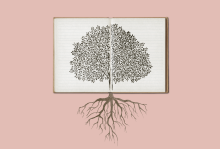
THESE DAYS, I gather strength from predictability. Being home from work amid a global pandemic with two children—a toddler and a teenager—has filled my world with inventive ways to press on while working full-time, schooling the kids, and being a graduate student myself.
I have a newfound green thumb—working with my mini-garden, I recount stories from my childhood, stories of triumph, perseverance, and restless hope. I hope my toddler clings to these stories when things seem uncertain. I am also creating new stories to share for years to come. My journal is overflowing with COVID-19 stats, sketches of plants, and day-to-day business. It has become a place I document our lives. When my children grow old, they will look to this time and wonder how we made it through or how we handled this uncertainty because they yearn for a time when things feel hopeful again. I hope my journals will help them remember and understand how we coped with a time when we self-quarantined, socially distanced, stayed six feet apart in masks.

I SAT DOWN with a co-worker to talk about presence and how to make God manifest in seasons that task us with injury, depression, and even death. Seasons of impeachment hearings, 700 missing women from ICE custody, and children still detained at detention facilities begin to create sinkholes in our spirits. My co-worker likened these experiences to a leaf floating on the waters of a raging river. The leaf is carried by the current without real direction, yet the leaf endures. A season of raging rivers has taken a toll on my faith, has created holes in the fabric of my believing. Every day I ask, where is God in this?
For the last couple months, I have found it hard to articulate my feeling of suspended belief. As a poet, a writer, a lover of words, there is a tension with sharing that information in words. I’ve begun to explore other media for translating these feelings. In November, I taught myself to sculpt paper. I’m not the best at it, because I’m tempted to create words to explain these images, but I need to let the image do most of the work. There is a beauty in doubt, a beauty that makes God manifest through our hands when we can’t articulate it with our voices or our words.
What do I look like inside, in wavering belief? Where do I find God in this? God finds me working meticulously into the morning, at a loss for words, but with an X-Acto knife cutting intricate curves and penetrating delicate layers of paper to make manifest the interior of myself.

The film also gets right Rogers’ deep belief in God and Junod’s persistent doubt. Junod was raised a Catholic but fell away from the church. For a while he attended a Presbyterian church, but now does not. He is still interested in the spiritual, he says, and a lot of that stems from his relationship with Rogers. This summer, as publicity for the movie was heating up, Junod recovered 70 emails he exchanged with Rogers from an old laptop, many of them about theology.

WHEN TERESA P. MATEUS attended gatherings on Christian contemplative spirituality, she often didn’t see herself reflected in the spiritual practices “centered in whiteness” that she found emphasized there. She yearned for spiritual resources that drew on the experiences of people of color—and out of that yearning, the Mystic Soul Project was born.
Mateus is a graduate of the New York University School of Clinical Social Work and the Living School at the Center for Action and Contemplation and author (under the name Teresa B. Pasquale) of two books on recovery after trauma, including Sacred Wounds: A Path to Healing from Spiritual Trauma. Da’Shawn Mosley, assistant editor of Sojourners, spoke with Mateus in August about how the Mystic Soul Project brings healing and spiritual nourishment to people on the margins.
Da’Shawn Mosley: Tell us about the Mystic Soul Project.
Teresa P. Mateus: Our basic mission is activism, mysticism, and healing centered around the life experiences of people of color. We create space for conversations, relationship building, practices, and other programming that have a people-of-color perspective and allow many to reclaim ancestral practices that have been abandoned or erased by Western traditions.

Donald Glover aka Childish Gambino has become a cultural icon. From his comedic work in Community to his acting in both Marvel and Star Wars franchises to his writing and producing of the critically acclaimed show Atlanta, the versatile Grammy-nominated artist is a creative force. Throughout all of this commercial and critical success, Donald Glover has refused to frame his work as a product; instead he wants to offer a participatory experience, a religious experience even.
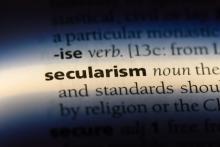
Some years ago, I was supervising a focus group of nonreligious Latinxs. The topic of the focus group was politics and religion. As the discussion progressed, someone meekly mentioned that they were not religious, apparently expecting the judgment of their fellow group members. But they were not judged. One by one, fellow group members surprised each other as they admitted that they were also not religious. They were unaware that there were others like them. Their experiences have been ignored by their ethnic communities and society at large because they do not fit the stereotype of the pious Latinx. Nevertheless, it’s important for religious people and the broader public to understand this particular group.
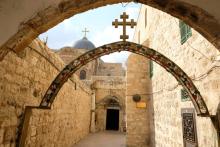
I constantly ask myself if I’m betraying my family by responding to the rituals and traditions they so earnestly sought to escape. But then I think about their conversion stories and how they made these decisions to become closer to Jesus.

“Austin,” which opened to the public on Feb. 18, during the season of Lent, has so far drawn 12,000 visitors to the grounds of the Blanton Museum of Art at the University of Texas at Austin. Many of them are, no doubt, nonbelievers too. But even they have taken note of the work’s spiritual leanings.

MY MOTHER LIVED WITH dementia for more than 20 years. My family members all experienced grief that was deep and complex, yet there were surprising moments with Mom that I found profoundly spiritual. As I spent time with her through the stages of her Alzheimer’s, I experienced a few times when she reached a place more complex and lucid than our understanding of her medical condition might allow.
As a scientist with an interest in chaplaincy, I wondered: What is known about this intersection of dementia and spirituality? What does the church say about dementia? How might all this inform our ministry to those experiencing dementia?
“Dementia” itself is a difficult word. Its origin comes from “de-” (undoing) “mentia” (mind). Already this label stigmatizes a person. A preferred term might be ADRD: Alzheimer’s Disease and Related Diseases. Alzheimer’s is a brain disease thought to cause some 60 to 80 percent of dementia cases. Related diseases include vascular, frontotemporal, and Lewy Bodies types of dementia. All have symptoms of memory loss, cognitive loss, and eventually physical loss (such as the inability to walk), caused by progressive damage and death of brain cells.
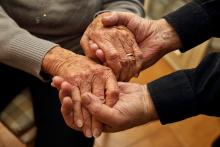
Churches in Great Britain, and increasingly in the U.S., have developed ways to become “dementia friendly.” Here are a few suggestions.
- Educate church staff and laity to have at least a basic understanding of dementia and how it affects a person physically, emotionally, and intellectually.
- Ensure that the worship space is safe and welcoming to the elderly and cognitively impaired.
- Provide a volunteer companion for the person with dementia to allow the caregiver to relax a bit and worship.
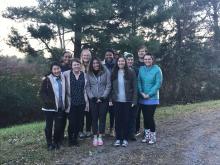
I was the first intern of Cycle 34 to arrive at the Sojourners intern house in Washington, D.C., in August. An incredibly generous staff member picked me up from the airport, drove me the hour back to the house, and left me to settle into my new home (later I learned that this type of generosity was just a part of the job at Sojourners, but that is another story altogether).

In recognizing the challenges of working for social justice, spiritually-rooted social action provides something of substance to the people in movements. From this place of rootedness, social movements can set intentions that point towards sustainability.
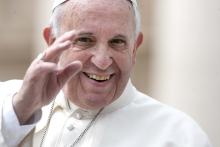
Despite criticism from conservative opponents who question his approach to church doctrine and his reform of the Vatican Curia, the pope said he had never lost his peace of mind.

It's my experience, observationally and personally, that people of faith go through the same kind of U curve, the same ennui that you experience psychologically. …. this malaise, this sense that you're praying and no one's listening, that the honeymoon is over. Those really rich feelings during prayer or everyday life — that God is here and present in this moment, “I feel the palpable presence of the Holy Spirit” — for most people, I think that ebbs. I think that's part of the plan.
… I talked to a group of nuns who are in their 50s, 60s, 70s, and 80s, because I figured they had a dog in this fight — if they lost their faith it actually would matter. What do you do when stuff gets boring or dull or hard? To a nun, their answer was the same — sometimes you don't feel God, and you just keep going. It's a relationship.

A BEEPING, BUSTLING Boston intersection is a strange place for a sanctuary, but on a blustery August evening, the corner of Beacon Street and Massachusetts Avenue becomes just that.
“This is holy ground,” says Rev. Laura Everett to several dozen people who form a semicircle around her and a lily-white bicycle chained to a concrete pole. Flowers overflow from the bike’s front basket.
“We’re here to dedicate this ghost bike,” Everett tells the growing crowd, “a visible sign of an invisible reality—that we’re fragile humans, and we’re only here for a little while.”
Everett, clad in religious vestments, and the crowd around her, wearing bike helmets and messenger bags, are installing the “ghost bike” as a memorial to 38-year-old cyclist Anita Kurmann, a beloved endocrine surgeon in the city, who was killed 13 days earlier when she was struck by a flatbed truck. A cyclist reads Psalm 23 into a megaphone and another reads a letter from Kurmann’s lab supervisor before Everett leads the congregation in a simple call-and-response prayer.
“When we choose to take a bike instead of a car,” Everett prays, “when we choose to listen instead of shout, when we choose advocacy instead of complacency, when we choose to get curious instead of cranky, when we choose to heal a broken world instead of cursing it, when we travel past this spot, remind us of Anita.”
“Holy One,” the crowd responds, some with eyes clenched shut, “hear our prayer.”
It’s a remarkable thing to witness (even on YouTube months later): a Christian minister leading a wildly diverse community of cyclists in prayer and lament for a fallen sister, and for each other. Her bike ministry extends beyond presiding over ghost bike ceremonies, though. Everett—a United Church of Christ minister and executive director of the Massachusetts Council of Churches—leads a “blessing of the bikes” each May where she prays for cyclists’ safety and anoints dozens of sets of wheels with chain lube. And as a four-season commuter cyclist herself who’s officiated three ghost bike ceremonies for fellow cyclists in a little over a year, she’s become a fierce advocate for transportation infrastructure that respects and protects cyclists.
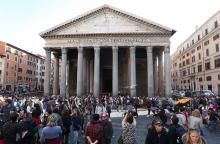
Italy may be the spiritual home of 1.2 billion members of the Catholic Church around the world, but a new poll shows only 50 percent of Italians consider themselves Catholic. The poll, published in the liberal daily L’Unita on March 29, challenges long-held perceptions that Italy is a “Catholic” country, despite the popularity of Pope Francis and the historic role of the Vatican City State in the heart of Rome.
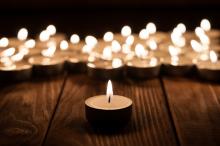
As a social concept, humanism isn’t a threat to religion, nor actively working against it — humanism is simply a growing alternative in terms of spiritualism and rationalism. These six burial practices of humanist funerals can help us understand why.

A friend of mine who was serving as chief of his band said that the heart of Indigenous Cree spirituality revolves around praying for good hunting in the fall, and giving thanks for good hunting in the spring.
When I relate this story, sometimes people ask, “How do you know it was good hunting?”
I replied, “If you make it through the winter alive, it was good hunting.”
In Indigenous Cree theology, we begin with the idea that it is a good world. The Creator made her, and she provides for us. Our response to enjoying the world that Creator has provided is to give thanks.
Thanksgiving fulfills the circle of relationships that characterize our journey here on the circle of the earth. Being unthankful can indicate a shift in focus, from the relationships that make up our world to focus upon ourselves.